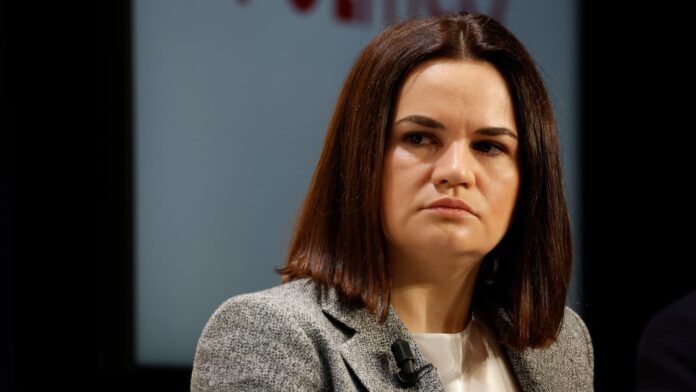Belarus’ exiled opposition leader, Sviatlana Tsikhanouskaya.
Bloomberg | Getty Images
Sviatlana Tsikhanouskaya, the exiled opposition leader of Belarus, told CNBC she “wasn’t surprised” by the court’s verdict after she was handed a 15-year sentence in a prison camp.
The Minsk court on Monday, which convicted Tsikhanouskaya in absentia, found her guilty of treason and conspiracy to seize power.
“It was predictable that Lukashenko would try to take revenge on me,” Tsikhanouskaya told CNBC’s Dan Murphy Tuesday after the verdict.
Alexander Lukashenko, who has ruled the ex-Soviet country with an iron fist since 1994, has “underestimated the will of people for change,” she added.
Tsikhanouskaya fled Belarus after running against incumbent Lukashenko in a 2020 election that was marred by protests and arrests, brutal beatings and the torture of thousands, according to Human Rights Watch. Lukashenko’s 2020 election victory, in which he claims to have won 80% of the vote, was called a “deeply flawed and fraudulent presidential election” by multiple western governments. The U.N. criticized Belarus “for police violence against peaceful protesters and journalists” following the “controversial presidential election.”
Tsikhanouskaya was forced into exile with her children a day after the 2020 vote. Her husband, Sergei, a former presidential candidate and critic of the president was jailed for 18 years in 2021, and remains behind bars in Belarus.
“Our movement is unstoppable” Tsikhanouskaya told CNBC, vowing to fight on. She said Lukashenko was wrong if he thought the “sentence would stop me or our movement.”
“We will continue to do what we do because our comrades, our beloved, our friends are behind bars in reality,” Tsikhanouskaya told CNBC, referring to the nearly 1,500 political prisoners currently held by the Lukashenko regime in Belarus.
“We have to continue our fight to release all of them,” she added. Tsikhanouskaya’s sentencing comes just one week after Belarus sentenced Nobel Prize winner Ales Bialiatski to 10 years in prison.
Media across the country is closely monitored and journalists who dare to speak against the regime are typically imprisoned. According to the European Parliament, “the necessary reforms to provide media freedom have never materialized. Instead, over the years various laws have lessened the rights of independent journalists and imposed limits on both traditional and electronic media.”
Tsikhanouskaya reiterated to CNBC that Belarusians should “look for information in alternative sources of media” and continue their resistance “but safely.”
“Until Belarus is free, they will be a constant threat to Ukraine,” Tsikhanouskaya told CNBC Tuesday.
Lukashenko is a close ally of Russia’s President Vladimir Putin, and allowed Russian troops to use his country as a staging area during the initial invasion of Ukraine in February of 2022.
Last week, Lukashenko paid a state visit to China, despite warnings from U.S. officials. Ukrainian military officials warned Belarus in October after Russia sent thousands of troops back to the country, and fears of a joint incursion grew. Russia and Belarus extended military drills in January of this year, causing heightened concern that Russia is pressuring its closest ally to join the war in Ukraine.


